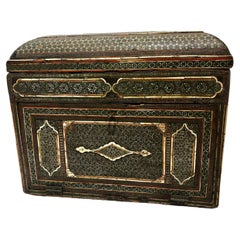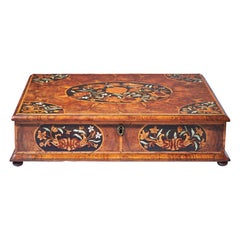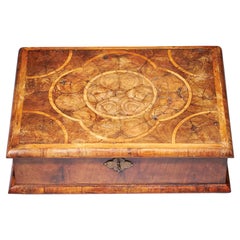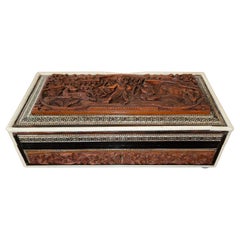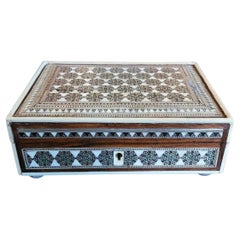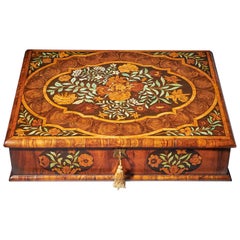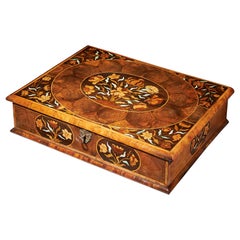Holly Decorative Boxes
to
3
2
1
43
4,163
3,162
1,386
1,179
2
1
2
2
2
Height
to
Width
to
3
3
3
Material: Holly
19th Century Anglo Indian Inlaid Mosaic Box With Drop Front and Drawers
Located in Stamford, CT
19th Century Anglo Indian fall front box with six drawers with metal pulls. The exterior and interior inlaid throughout with bone and various woods. Intricate geometric designs cover...
Category
Mid-19th Century Antique Holly Decorative Boxes
Materials
Bone, Fruitwood, Holly
17th Century William and Mary Floral Marquetry Olive Oyster Lace Box, Circa 1685
Located in Oxfordshire, United Kingdom
A fine and rare 17th-century William and Mary olive oyster floral marquetry lace box, circa 1685. England
The cross grain olive moulded and holly banded top is centred by an oval of...
Category
17th Century English William and Mary Antique Holly Decorative Boxes
Materials
Bone, Holly, Tulipwood, Olive, Oak, Ebony, Boxwood
17th Century William and Mary Olive Oyster Lace Box, Circa 1680-1700
Located in Oxfordshire, United Kingdom
A fine and rare 17th-century William and Mary period olive oyster lace box of perfect proportions. 1680-1700, England
The cross-grain moulded top is entirely covered in well-place...
Category
17th Century English William and Mary Antique Holly Decorative Boxes
Materials
Olive, Holly
Related Items
19C Anglo Indian Carved Teak Wood and Sadeli Mosaic Box
Located in Dallas, TX
PRESENTING A LOVELY 19th century Anglo-Indian Carved Teak Wood and Sadeli Mosaic Box, featuring a carving of a Hunt Scene.
Made circa 1870 in Bombay, India during the Rule of the Br...
Category
Late 19th Century Indian Anglo-Indian Antique Holly Decorative Boxes
Materials
Silver, Pewter
19C Anglo Indian Bombay MOP Sadeli Mosaic Trinket Box
Located in Dallas, TX
PRESENTING a LOVELY 19C Anglo Indian Bombay MOP (Mother of Pearl) Sadeli Mosaic Trinket Box from circa 1875-85.
Gorgeously detailed and hand-crafted ‘sadeli mosaic’ inlay, from the Bombay Area, with deep greens with silver, pewter, mother of pearl, bone and ebony in geometric patterns.
The box case, is made of sandalwood but completely covered in MOP, bone, faux ivory, ebony and mosaic inlay.
Edged with faux ivory and banded with a different pattern of sadeli mosaic.
Some minor damage to the top (repair is obvious in pics) and ivorine replacements to some edging, but it still a BEAUTIFUL BOX and of real QUALITY!
The mosaic work is FABULOUS!
Box opens to reveal its original blue velvet lining.
It sits on 4 (recently added) silvered button feet.
SADELI MOSAIC: “Anglo Indian boxes were made in India for the English residents from the early part of the 18th century. They were brought back or sent back to England usually by the people who had commissioned them. From the beginning of the nineteenth century they were imported more commercially, although not in any significant numbers until the middle decades. They were very highly valued, especially the early ones, to the extent that the designs were copied on late 19th and early 20th century tins.
The ancient art of Sadeli Mosaic is said to have been introduced from Shiraz in Persia via Sind to Bombay, a long time before the Anglo Indian boxes were made. It was a technique, which required a high degree of skill and patience. It was executed very lavishly, in that the frequent cuts wasted a great amount of the precious materials used. The workmanship was however more than commensurable to the value of the materials.
Ivory, silver, pewter (or other metals), wood and horn were cut into faceted rods which were bound together to form geometric patterns. When the glue has set, the rods were sliced in transverse sections. This gave the maker a number of angled circular pieces in the original pattern. Several variations of patterns could be achieved by combining the materials in different ways. The ivory was sometimes dyed green to give an extra color.
The mosaic pieces in a combination of patterns, often separated by ivory, ebony, horn or silver stringing were used to veneer sandalwood boxes. In the early boxes, which date from the turn of the 18th to the 19th century, there are large panels of mosaic covering tops and sides of boxes. It took incredible skill to cover such large areas without any shakes or wavering of the pattern. The corners and joins on these boxes are impeccably matched.
The makers (reputed to be Persian) of Sadeli mosaic made in the first two decades of the 19th century displayed a total understanding of the qualities of the different materials they used. They combined substances, which can expand and contract according to atmospheric conditions with others, which are hard and unyielding. The result was a sharp definition of the lines and patterns, which made up the whole design.
On the early boxes the designs look deceptively simple. The fact is, they emerged from a culture, which had mastered geometry and understood how to generate a pattern from a set number of points. The patterns are so harmoniously combined that their incredible complexity is not immediately apparent.
The earliest Sadeli boxes...
Category
Late 19th Century Indian Anglo-Indian Antique Holly Decorative Boxes
Materials
Silver
1950s Anglo Indian Micro Sadeli Mosaic Inlaid Jewelry Box
Located in Moreno Valley, CA
1950s Anglo Indian Micro Sadeli Mosaic Inlaid Jewelry Box.
DIMENSIONS: 7ʺW × 7ʺD × 2.5ʺH.
Indo Persian Moorish style micro mosaic inlaid jewelry box with lid.
Intricate inlaid Anglo ...
Category
Mid-20th Century Indian Moorish Holly Decorative Boxes
Materials
Bone, Fruitwood
Large Anglo Indian Mosaic Inlaid Jewelry Hexagonal Box 1950s
Located in Moreno Valley, CA
Large Anglo Indian Moorish Islamic style micro mosaic inlaid jewelry box with lid.
Intricate inlaid Anglo Persian box with floral and geometric Moorish Sadeli design in an hexagonal shape form with micro mosaic marquetry, very fine artwork.
Museum collector piece like the one in Doris Duke Islamic Art Museum.
The repeating geometric patterns of Sadeli Mosaic are what give it beauty and richness.
This decorative technique is a type of micro mosaic featuring repeating geometric patterns.
Dimensions: H: 5 in : 12 in W x 12 in. D.
Circa 1950s.
Sadeli mosaic art is a highly skilled craft, it has had a long history in India and the Middle East with early examples dating back to the 16th century. In the 1800s, it became popular as a decoration on a variety of boxes, card cases, and chess boards imported from India. Since Bombay became a center of making them, they became known as Bombay boxes.
The ancient art of Sadeli Mosaic is said to have been introduced from Shiraz in Persia via Sind to Bombay, a long time before Indian boxes appeared. The designs on early boxes look deceptively simple. The fact is they emerged from a culture which had mastered geometry and understood how to generate a pattern from a set number of points. The patterns are so harmoniously combined that their incredible complexity isn’t immediately apparent to the viewer.
Will look great in a Moroccan decor...
Category
Mid-20th Century Indian Anglo-Indian Holly Decorative Boxes
Materials
Wood
Antique Anglo-Indian Fluted Writing Box With Secret Drawers. Early 19th Century
Located in St Annes, Lancashire
Wonderful writing box made from a tropical hardwood
Fabulous shape and plain fluted carving. It gives it a modernist appearance
Probably Sri Lankan
3 secret drawers*
Replaced lea...
Category
Early 19th Century Sri Lankan Anglo-Indian Antique Holly Decorative Boxes
Materials
Wood
$650
H 5.5 in W 16 in D 9 in
Anglo Indian Micro Mosaic Inlay Jewelry Box
Located in New York, NY
Exquisitely crafted early 20th century Anglo Indian micro mosaic Sadeli box with gorgeous antique Persian geometric pattern.
The finely detailed box featu...
Category
Early 20th Century Indian Anglo-Indian Holly Decorative Boxes
Materials
Bone, Fruitwood
Anglo Indian Inlaid Work Box
Located in Tampa, FL
An anglo Indian workbox made of ebony. The tray lifts up from the box on the lid which is also inlaid in ivory and ebony and has a bone round disc that is signed New Bedford 1810. Th...
Category
1810s Indian Antique Holly Decorative Boxes
Materials
Bone, Ivory, Ebony
Late 17th Century Leather And Brass Travelling Box
Located in Benington, Herts
A very fine and interesting late 17th century English work box or travelling case
English Circa 1680
Of conventional form with slightly domed lid, this piece has acquired a magnifi...
Category
1680s English Antique Holly Decorative Boxes
Materials
Brass
William And Mary Kingwood Coffre-Fort
Located in Essex, MA
With rectangular hinged top with brass strap mounting. When open the front folds down to expose hidden compartments and wells. Case mounted the same as the lid. Side carry handles. I...
Category
Early 18th Century European William and Mary Antique Holly Decorative Boxes
Materials
Brass
Silver Chest, After 17th Century Models, circa 20th Century
Located in Madrid, ES
Arquette inspired by 17th century models. Silver, Spain, 20th century
Rectangular casket made of silver in its color, with four legs in the corners in the form of roll and finished ...
Category
20th Century European Other Holly Decorative Boxes
Materials
Silver, Other
19th Century Anglo-Indian Porcupine Quill Box with Key
Located in Atlanta, GA
A Stunning Porcupine Quill Box, made from black wood with porcupine quill decorations.
These were highly valued for their rich timbers and intricate craftsmanship. The production of ...
Category
Late 19th Century Antique Holly Decorative Boxes
Materials
Other
19th Century Anglo-Indian Mughal Box
Located in Moreno Valley, CA
19th century Anglo-Indian Mughal wood box, inlaid and hand carved with the Taj Mahal and some flowers all around.
Jewelry box, Anglo-Raj box from India in great condition.
Nice Mughal Bombay Box...
Category
Late 19th Century Indian Anglo Raj Antique Holly Decorative Boxes
Materials
Sandalwood
Previously Available Items
Important 17th Century Charles II Marquetry Olive Oyster Lace Box, Circa 1680
Located in Oxfordshire, United Kingdom
A fine and rare 17th century William and Mary olive oyster marquetry lace box, circa 1670-1690. England
Attributed to Gerrit Jensen.
The mould...
Category
17th Century English William and Mary Antique Holly Decorative Boxes
Materials
Bone, Boxwood, Ebony, Oak, Olive, Tulipwood, Holly
H 5.52 in W 23.04 in D 17.33 in
17th Century William and Mary Floral Marquetry Olive Oyster Lace Box, circa 1680
Located in Oxfordshire, United Kingdom
A fine and rare 17th century William and Mary olive oyster marquetry lace box, circa 1670-1690. England
The ovolo-moulded and holly banded top is c...
Category
17th Century English William and Mary Antique Holly Decorative Boxes
Materials
Bone, Oak, Olive, Boxwood, Ebony, Tulipwood, Holly
H 4.93 in W 21.26 in D 16.15 in
17th Century Museum Grade William and Mary Olive Oyster Marquetry Lace Box
By Thomas Pistor
Located in Oxfordshire, United Kingdom
17th century Museum Grade William and Mary Olive Oyster Marquetry Lace box, C. 1670-1690. England
The ovolo-moulded and holly banded top is centred...
Category
Late 17th Century English William and Mary Antique Holly Decorative Boxes
Materials
Bone, Boxwood, Ebony, Olive, Holly
H 4.73 in W 21.26 in D 16.15 in
Pair of George IV Regency Specimen Wood Parquetry Boxes of Sarcophagus Shape
Located in Oxfordshire, United Kingdom
An extremely rare and fine pair of George IV Regency exotic timber boxes of sarcophagus shape, decorated to all surfaces and lined in silk velvet.
The finely veneered top is deco...
Category
Early 19th Century European George IV Antique Holly Decorative Boxes
Materials
Boxwood, Ebony, Olive, Rosewood, Holly, Yew, Cocobolo
H 4.73 in W 11.03 in D 9.06 in
Unusual Welsh Early 19th Century Inlaid Tea Caddy
Located in Greenwich, CT
Unusual early 19th century welsh tea caddy of sarcophagus form, the canted top with ebony faceted boss, the front having double pinwheel inlay, the top and inner lids inlaid with dia...
Category
Early 19th Century Welsh Regency Antique Holly Decorative Boxes
Materials
Ebony, Kingwood, Walnut, Holly
Modernist Rosewood and Cedar Monogrammed Humidor by Louis Vuitton
Located in New York, NY
This elegant humidor was realized by Louis Vuitton- one of the world's premiere luxury brands since its inception in 1854. Executed in lacquered dark rosewood with blonde holly trim ...
Category
Early 2000s French Modern Holly Decorative Boxes
Materials
Brass
Profusely Inlaid Tunbridge Regency Tea Caddy
Located in Greenwich, CT
Fine early 19th century Tunbridge ware tea caddy, the top inlaid with geometric patterns, the canted sides with wood mosaic ivy banding over further geometric inlay, standing on gilt...
Category
Early 19th Century English Regency Antique Holly Decorative Boxes
Materials
Ebony, Olive, Walnut, Holly, Yew
More Ways To Browse
Tiffany Trinket
Toilet Box
Top Hat Box
Trinket Pill Box
Victorian Letter Box
Vintage Hinged Trinket Boxes
White Bone Box
White Bone Boxes
York Minster
Antique Casket Stand
Antique Chocolate Box
Antique French Music Box
Antique Limoges Porcelain Boxes
Antique Thread Box
Art Deco Porcelain Powder
Asprey Antique Boxes
Baroque Casket
Bent Box
